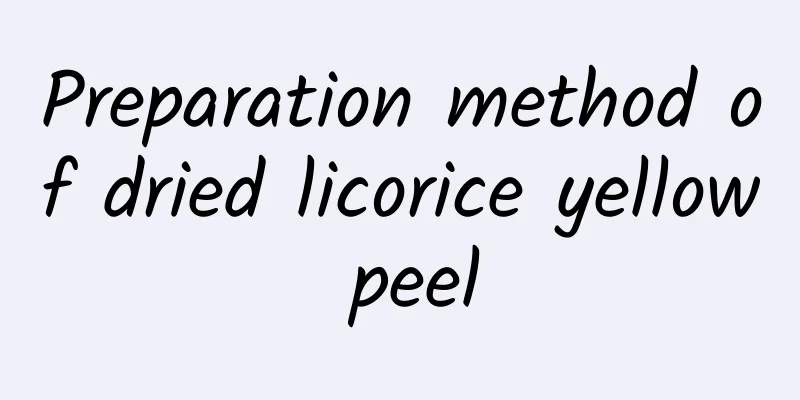Preparation method of dried licorice yellow peel

|
Many people have always thought that licorice and dried tangerine peel are the same medicinal material, especially since they look similar in appearance. In fact, they are not. Licorice and dried tangerine peel are two different medicinal materials. Licorice is often found in many cough medicines, and licorice is very effective in treating coughs. Huangpi is a kind of fruit peel that has the effect of dispelling wind and cold. So how to make dried licorice Huangpi? Characteristics of licorice root: The root is cylindrical, 25~100 cm long and 0.6~3.5 cm in diameter. The skin has varying degrees of tightness and the surface is reddish brown or grayish brown. The rhizome is cylindrical, with bud scars on the surface and pith in the middle of the cross section. It has a slight odor and a sweet and special taste. Functions and indications: clearing away heat and detoxifying, removing phlegm and relieving cough, and relieving abdominal pain, etc. It likes a dark, humid, dry climate with long sunshine and low temperature. Licorice grows mostly in arid and semi-arid desert steppes, desert edges and loess hilly areas. The roots and rhizomes are used for medicinal purposes. 【Effects and Functions】: Replenishing Qi and tonifying the middle; relieving acute pain; moistening the lungs and relieving cough; purging fire and detoxifying; harmonizing various medicines. It is mainly used for fatigue, poor appetite, thin muscles and sallow complexion, palpitations and shortness of breath, abdominal pain and loose stools, cramps and pain in the limbs, irritability, cough and asthma, sore throat, sore and swollen carbuncles, fetal toxicity in children, and drug and food poisoning. It is used for spleen and stomach weakness, fatigue, palpitations and shortness of breath, cough with excessive sputum, cramps and pain in the abdomen and limbs, carbuncles and sores, and to relieve the toxicity and potency of drugs. Huangpi's profile: [Properties and flavors] Fragrant, neutral in nature, sour, slightly bitter and spicy. 【Ingredients】The seeds contain 53.2% oil. Both the peel and leaves contain volatile oils. The leaves also contain phenols, flavonoids and amino acids. The bark contains a variety of bioalkaloids such as scutellaria baicalensis, phellodendron chinense, terpenoid alkaloids, as well as alcohols, mucilages and ester components. [Alias] Rescue, Stinky Cop 【Classification】 Cornaceae 【Indications】Anti-wind, cold and dampness; low back pain; traumatic injury; fracture [Ecological environment] Grown in sparse streamside forests or evergreen broad-leaved forests at an altitude of 1000-3000m [Harvest and storage] Harvested in spring and summer, used fresh or sun-dried [Resource Distribution] Published in Southwest China, Hubei, Tibet, etc. The efficacy and function of yellow peel: 1. Relieve stagnant heat and relieve hernia pain. The leaves can prevent and treat influenza. The root can treat gas pain and hernia pain. This is a folk medicine widely used by people in the south. 2. Efficacy: dispel wind and cold; activate blood circulation and relieve pain. |
<<: What are the effects and functions of Sophora flavescens?
>>: The effect of boiling licorice and mung beans in water
Recommend
Introduction to Chinese medicine mistletoe
The Chinese medicine mistletoe has always been on...
The efficacy and function of celeriac
The medical value of celeriac is beyond our imagi...
Why should you never wake up a sleepwalker? Can it really kill someone?
Planning and production Source: Dr. Curious (ID: ...
[Celebrating the New Year in the Space Palace and Spending the New Year in Space] New Year's Eve on the Space Station
Do astronauts celebrate the Chinese New Year in s...
The efficacy and function of mountain orange
Wild tangerine is one of the common traditional C...
Dolphins can not only act cute but also fall in love! Why do dolphins like to be close to humans?
Do you believe that there are also "heart-wr...
Come, count how many birds are there in this picture?
Not long ago, Guokr held a Youth Forum with the t...
The most elite Eight Banners soldiers, from the Solon and Dahur soldiers outside the Great Wall, still went to fight in the Dzungar at the age of 80.
Now when people mention the Eight Banners soldier...
The efficacy and function of stone silkworm
Stone silkworm is a common type of traditional Ch...
Deutsche Bank: Apple Pay adoption increased 52% year-on-year and is eating into PayPal's market share
In a recent report, Deutsche Bank analyst Bryan K...
The efficacy and function of southern snakehead
For the Chinese medicinal material such as Snakeh...
Herbal medicine for treating ringworm in rural areas
Many elderly people in rural areas do not like to...
Effects and functions of citronella
Gardenia is a plant that can be used as medicine....
Does bacon cause cancer? Five things you need to do to eat bacon healthily
In my country, bacon is a delicacy with a unique ...
What are the effects of drinking winter mulberry leaves soaked in water?
In the southern region, mulberry trees are a very...









